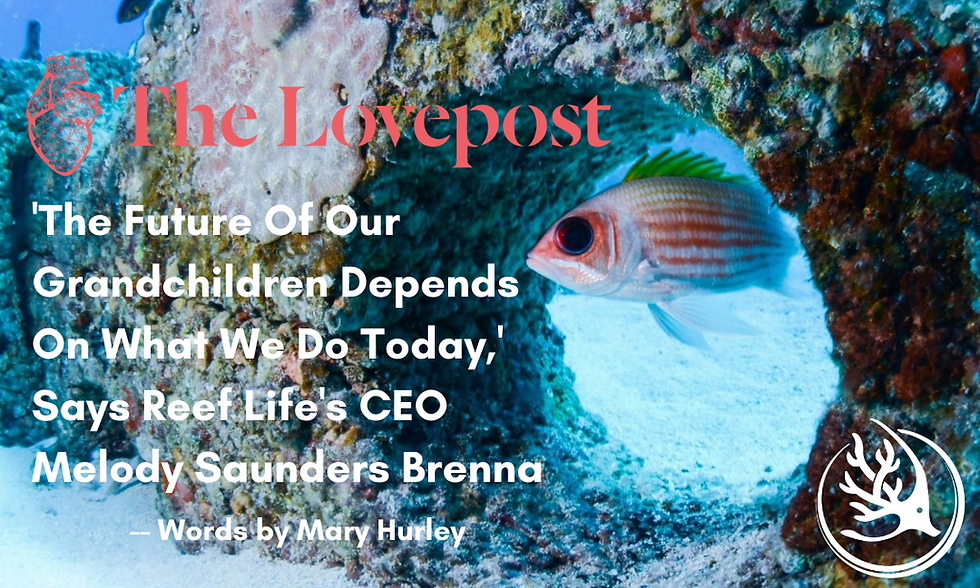LovePost Global Story Featuring IntelliReefs Bio-mimicking Ocean Habitat Technology
- Feb 4, 2022
- 4 min read
In December 2021, The LovePost Global published an article featuring the Reef Life Foundation and our IntelliReefs nanotech solutions. Founded in 2018, The LovePost magazine recognizes themselves as an alternative, socially responsible "slow media" platform dedicated to tackling social and environmental issues through a solution-focused lens. Their stories are produced by a diverse collective of change-makers from around the globe, who are fueled by a united goal: to create content that brings about positive change and makes planet Earth a better and more inclusive place for all its inhabitants.

We've had the privilege of working with many of the great writers from LovePosts' team on a few different publications now, including Rowena Bahl, Louisa Molly Annabell, Maddi White, and Mary Hurley. Their team has consistently written about the efficacy of our foundation; the science behind the habitats, and the need for sustainable initiatives combined with actions, to be taken in the ocean world.
LovePost's most recent article on the Reef Life Foundation was written to be featured in their current themed series, "Bioinnovators: The Humans At The Forefront Of BioTech." In this series, their authors hold multiple interviews with organizations and entrepreneurs at the forefront of changing the world through biotechnology. "With each interview, we hope to shine the light on conscious innovators and trailblazers across the globe who are using the natural world, combined with modern technological innovations, to find new solutions to the world’s most pressing problems, explore the world of biotechnology and its potential to tackle some of the world's most pressing issues," (LovePost).
Below you can find some excerpts from this interview with author, Mary Hurley, and our CEO, Melody Brenna.
So, would you say that was your biggest take away from the project—that species can thrive in areas that people might say is too difficult, or isn't worth it?
"Yes, to think that there are places that somebody who knows biology and the time to diverse biology growth says, "That's not worth saving". There are seven reefs on the planet that reef ecologists have said, "These are worth saving," and it's only because of the high biodiversity on these reefs. Florida didn't make the cut. The Caribbean didn't make the cut. Mexico, which has the next biggest reef next to Australia, didn't make the cut...."
"So in the eyes of some biodiversity specialists; if we only have a decade, if we can only save these seven and maybe save the whole planet, it's just down to biodiversity. Isn't that wild?...now we know that this product, our mineral [Oceanite], creates biodiversity on its own, "back to nature, letting mother nature do it herself," Now we know we shouldn't stop."

So, moving away from the Caribbean now, you have recently co- founded your first Canadian project with Emily Higgins, IntelliReef's director of ocean science. Now, this project centers around kelp. Researchers have documented an 85–99 percent decline in kelp biomass over the last forty to sixty years along Nova Scotia's eastern shore. Could you talk about what led you and Reef Life here, and what role kelp plays within Earth's biodiversity?
"Yeah, that is a very cool question, Remember we were talking about cues that coral have: sight, smell, taste, hearing? Believe it or not, kelp larvae follow the same cues. They're looking for that crustose coralline algae. They're looking for that pink calcium buildup on a very hard substrate. They're looking for a healthy place with all kinds of fish because they thrive in that area too. Kelp also, they're super quick growing, they hold carbon and then the carbon goes back down into their roots. Scientists understand that kelp are a carbon holding element, and that's one of the reasons why the kelp is so important to Canada and to the ocean—because it's holding carbon within it. Not only [is kelp] providing places for the baby fish, places for the big fish to hide, places to help coastal protection, but it's a huge carbon mitigator as well. So if we had no carbon mitigation on the coastlines of temperate waters—Canada, Norway, you know, all of that— then we really are in trouble in a totally different way than the coral reefs."
What is the background to ReefShips? How are they different from your previous technologies? Is it a response to the different ecosystems found in Canada?
"The ReefShip modules are a response to coastal restoration all over the planet. Researchers have asked us, 'Can't you design something natural? Why are we putting unnatural looking, square blocks [in the ocean]?' So our designer, who is actually my son, Guyon, thought if these materials are going to be there a thousand years, it's just going to become a calcified organism of the planet. Because the water and the creatures can go through that rock, they will completely inhabit it. But there's no reason our habitats can't look organic and natural. It doesn't have to look like somebody designed it. The end game is that it becomes a biodiverse part of the ocean, a healthy, thriving part. Yes, it will be covered at some point, but it still needs to have that natural look and the natural beauty of what was there a millennia ago."






























